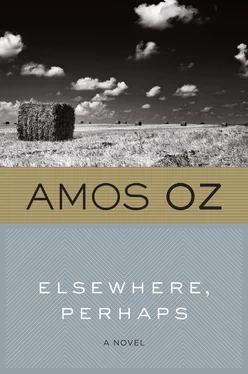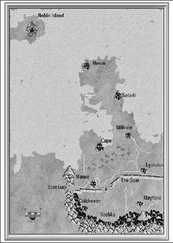Bottles are opened, and red wine is poured into plastic teacups.
The hubbub of the meal.
Herzl Goldring and his wife Nina enter, very late. They look for a place to sit. Gerda Zohar, in a black skirt and white apron, seats them at the last table. She smiles. Herzl mumbles:
"Yes, yes, Happy New Year, that's right, Happy New Year."
Outside all is silence.
The bungalows and nurseries are in darkness. The yellow lamplight falls in murky puddles.
Tomer, who, as his luck would have it, has to serve as night watchman on this festive night, leans on his rifle and scratches his head. It would not be true to say that he is thinking: truer rather that he is fuming. Beyond his post is a slope. At the foot of the slope is the swimming pool. Next to the pool is a pine wood. Behind the pines are graves. Beyond the graves are fields. At the end of the fields are mountains. If the mountains have eyes, then surely we and our New Year and all our old years must seem like grasshoppers to them. But high above the mountains the stars look down contemptuously on the mountains' haughtiness. What are the mountains when viewed by the stars? Heaps of shifting dust, here today and gone tomorrow. There is a terrible threat of arrogance in the stars. But when we look at them we see no arrogance. Only repose. Perhaps a faint flicker of mockery. Perhaps a watchful slumber. Perhaps some other quality, which we cannot grasp. Weariness overcomes us. Our hand drops. We shall drop with it. Our lives cascade from gulley to gulley till they drain away into the sand for a fleeting sensation in our hidden parts. If only we had the weight of massive mountains, the peaceful arrogance of stars, the calm of solidified lava, a magical key to unknown gardens, away from curse and blessing, hope and fury. Our flesh, our blood subject us to cruel humiliations. We cannot rid ourselves of the humiliation, but we are free to protest. Of course, the mountains will ignore our protest. But they are mountains, and what are we.
We cower at the foot of the mountains. What is beyond them? Vast desert plains, twisted canyons at the mercy of dry scorching winds. Anti-Lebanon Hauran Golan Bashan Gilead Moab Arnon Edom, a long grim mountain wall. Beyond them there is no enchanted garden. There is a land of lizard viper asp and fox. And beyond that are more mountains, more dreadful than ours, stretching away to the east. Beyond them is the plain of the two rivers, held in the jaws of the mountains. And further beyond, fresh mountain ranges spread to infinity, with peaks of permanent snow severed by knife-gashed valleys, where black goats furiously tear the scrub tended by shepherds as black as they are. And everything is tyrannized by the dread light of a merciless moon. We do not belong here. Our place is in cool shady gardens. But which is the way back.
"Happy New Year, Harismann," Ezra said, when the festive meal was over. The younger people were dancing in large circles, the older ones clustering at the windows.
"Happy New Year, Ezra," said Reuven, with a faded smile.
"So how are you, Harismann. How are you keeping?" Ezra continued, putting on a cheerful face.
"So-so," Reuven answered, with a weary shake of his head. Suddenly he exclaimed furiously:
"Why ask? We're old men. There's no point in asking."
"Keep well," Ezra concluded. "Look after yourself, Harismann. Take care."
"We're old men," Reuven repeated with a curious persistence.
Ezra turned away to look for his wife and his guest. He had the feeling he had spoiled something. Now he wanted company. He suddenly recalled his nocturnal journeys and relished the memory of roads swathed in drifts of white mist.
Reuven retired to his room. He washed, and glanced through the newspaper over a glass of tea. Dimly he heard the sounds of dancing. He heard the drone of the crickets. He got up and turned on the radio. A feverish voice speaking a strange language. No, it's not Dutch yet, Colonel, it's not your language yet.
He switched off. Swallowed a pill and washed it down with the remains of the tea. Turned restlessly in bed. Kicked the blanket off. Rolled himself up in the sheet. More sounds. He groaned. Thought about distant water. Felt a stabbing pain in his shoulder. Finally, sleep came over him. He dreamed of a plain full of wild horses. There were gigantic men, and women, too. The place and the people were strange. In his dream he tried to formulate something. A faraway shout shattered the picture and the words. Dim in the night came the sound of enemy soldiers singing on the slopes of the mountain. Their song howled outside Reuven's window and leaped into his dreams. Somebody cried far away. Reuven was flooded with a blackness in which abandoned boats were carried by the tide with broken masts. A bird screeched. Then fell silent. A new dream came, full of a pale finger not attached to any body, full of the sound of drums beating out a dim rhythm.
Reuven Harish woke up. The drums had not died down. Their faint rhythm had become stronger. The air was charged with sound. The shutters opened, and he saw, with wide eyes, the jagged flashes of machine-gun fire. It had started.
For some weeks now the fellahin had abandoned the Camel's Field. They had stopped coming down to it in their dark robes. Our patrols had been skirting its edge in the evenings, when the setting sun was shining into the loopholes of the enemy fortifications. The men inside had refrained from firing. Both camps seemed to be breathing deeply, tensely. If the rains had come a few days sooner, the Camel's Field would have remained uncultivated. In the spring it would have sprouted thistles and briars and colorful wild flowers. Perhaps even the dead might. But the rains chose to come later.
It happened that same morning.
Opposite Reuven Harish's window strode the large Figure of Grisha Isarov, in olive-green army clothes and enormous boots. A heavy black pistol hung carelessly from his army belt.
"Get down to the shelter," Grisha shouted. "Right away. Quickly. This is no time for the Muses."
At five o'clock in the morning, when the mountaintops were wreathed with an enchanted halo of purple light, the tractor had been started up. Its cab was heavily armored with steel plates. A large plow was coupled to it. The blades gleamed. The engine rumbled and roared hoarsely.
Twenty minutes before the sun burst through the mountain screen, the tractor had crossed the invisible line, put down a marker, and dug its tusks into the soil of the Camel's Field. As the sun rose, furious machine guns began tickling its steel ribs. Reuven Harish leaned out of his window and addressed the myrtle bushes outside:
"Welcome, Colonel. I knew you'd be back. And here you are."
He was half-asleep. For the moment.
It was a limpid blue morning. The fish ponds received the sunlight, transmuted it as water does, and sent out brilliant dashes.
The tractor pivoted on its tracks and began to cut a second furrow, parallel and close to the first. The bursts of machine-gun fire did not affect it. Such pinpricks were beneath its dignity. Solemnly, steadily it proceeded on its straight course. Reuven continued to stand at his window. He bit into an apple. Grimaced. Someone called out to him again to go to the shelter. Reuven asked why. Mundek shouted that everyone was in the shelter, the children, the women and the men who were not on duty.
"What are you waiting for?" he added.
Reuven asked himself the same question but could find no definite answer. He laughed aloud and threw the rest of the apple into the myrtle bushes.
Polished, resplendent, wearing a hat and a spotted tie, and equipped with a walking stick, Herr Berger the tourist stood outside the secretary's office and surveyed the scene about him.
Читать дальше












